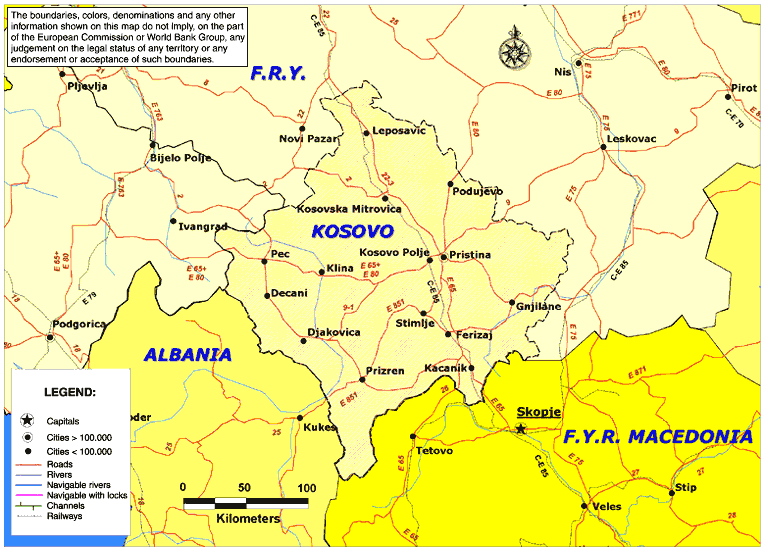
Source:
Economic Reconstruction and Development in South East Europe (EU/World
Bank)
Italy: German, Italians Mark Nazi Massacre (August 12, 2004)
Today’s Germany continues to pay tribute to the memories of innocent people killed during the Nazi massacre in many countries of the world. The German Interior Minister Otto Schilly who visited Italy to take part in commemoration, called the Tuscan village a “place of shame” for his nation. In August, 1944, Nazi SS soldiers surrounded the village in search for partisans. What they did instead was killing of 560 innocent civilians, mainly elderly, women and children. 66 year-old Enio Manici is one of the survivors of the massacre. He was only 6 years old then.
Spain: Small Bombs Rattle Northern Spain Cities (August 12, 2004)
Small bombs rattled two tourist cities in Spain leaving hundreds of people in panic and slightly injuring an elderly man. Bomb explosions during the peak of tourist season are characteristic of Basque separatist group ETA, which has sacrificed over 800 people since the start of its campaign for independence in 1968.
Poland: Schroeder Bows to Warsaw Anti - Nazi Heroes (August 1, 2004)
German Chancellor Gerhard Schroeder paid tribute to hundreds of thousands of Poles, mainly Jews, killed in a failed rebellion against Nazi forces 60 years ago, thus making a landmark gesture of reconciliation toward a new EU partner. He bowed twice in front of the monument to the insurrection under the gaze of now elderly Polish survivors.
Croatia: UN Court Sentences Former Croatian Serb Leader to 13 Years in Prison (June 29, 2004)
The UN court reached a verdict on former Croatian Serb leader guilty in deaths of more than 25,000 people, including women and elderly, during the Croatian war of 1991-1995.
Bosnia-Herzegovina: Bosnia Slowly Mends (December 11, 2000)
Five years after the 1995 Dayton peace accord, which ended the conflict in former Yugoslavia, many refugees, including old people, still do not have a home. Hajra Mandzic is in her 90s. She lost three sons, three grandsons, three brothers, and nine nephews at Srebrenica. Now, she is determined to spend the cold winter in a tent on the hillside where she used to live. Husein Burazerovi is in his late 60s. He is one of a few dozen Muslims living in tents on the site where thirteen homes are being rebuilt with the help of the Catholic Relief Services (CRS), a humanitarian organization.
Kosovo / Kosova: As Seen, As Told - Elderly,
Disabled (1999)
The conflict between the Yugoslav and Serbian
forces and Kosovo Liberation Army took a particularly heavy toll on
elderly civilians. Chapter 18 of the Organization for Security and
Co-operation in Europe's (OSCE) Kosovo Verification Mission report focuses on the frequent
abuse, abductions, and murders of elderly people.
Travesties
in the Balkans: A Serb's Tale (October 1, 1999)
In this featured article in the
University of Waterloo newspaper, a young
Serb man recounts some of the horrific atrocities he and his family
witnessed in the Balkans. Aleksandra Prodanovic's grandmother survived an attack by Kosovo
Albanians that killed almost all of the other elderly Serb people in her
village; his friend's grandmother was beaten and left for dead in
the street just because she spoke Serbian.
Tragedy of the
Elderly in Kosovo (May 6, 1999)
Elderly
refugees suffer greatly from lack of access to health care due to the
crisis in Kosovo. Many had to flee without sufficient food and often
without family support. A woman who has seen over a 100 years of Kosovar
history says, "I lived through the Nazis but I've never known
anything as bad as this."
War
in the Balkans - 'Slaves' Forced to Bury Victims (April 18, 1999)
Former British Foreign Secretary Robin Cook released a dossier in 1999
documenting 87 war crimes committed between March 25 and April 14
in Kosovo. Among the atrocities were the murders of 18 elderly people in
the village
of Burim.
Eighteen Civilians Massacred in
Kosovo Forest (September 29, 1998)
This Human Rights Watch press release documents the
heavy civilian casualties of the war in Kosovo, including an elderly woman and
two elderly men shot dead at close range in one village.
At Least 46 Albanians Killed in Kosovo Fighting (March 10, 1998)
The war in Kosovo took the lives of women, children,
and elderly civilians on all sides of the conflict. This Washington Post
article reports that 24 ethnic Albanian villagers, including six elderly
men, died after a three-day
assault by government forces.



